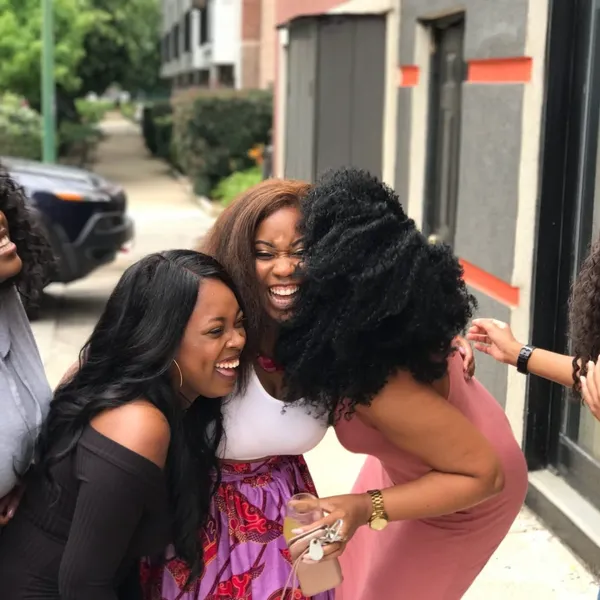Living In A New City And Feeling Nervous About Making Friends? These 6 Tips Can Help

The first big leap was moving to a new city and getting settled into my new home. The next big leap? Was finding community and belonging. Moving to a new city excited me! I looked forward to having my own apartment, decorating it, and exploring what the city had to offer. I also found excitement in the thought of meeting new people and expanding my connections. When it actually came down to it, I felt nervous. I heard that making new friends as an adult can be hard because we all have different responsibilities and schedules that may not align. I knew in order for me to really feel at home in my new city, I had to create community.
Having a community of people who I can share memories with, lean on in times of need, and inspire each other is something I always valued. I took a moment to truly center in on what I desired from the new friends I would make. Then I realized it all would have to start with me. I had to be centered and confident in who I was to attract who I desired to be aligned with. As someone who moved to a new city and established quality friendships, I gathered these six tips that helped me feel grounded and create community in hopes that it will help you, too.
6 tips to start building community and making new friends in a new city:

Sean Anthony Eddy/ Getty Images
Be true to yourself
Do you know who you are? If someone asked you to describe yourself in three words, what words would you use? In order to develop deep friendships, you must be a friend to yourself first. Know what refuels you and what zaps your energy. Self-study your habits and why you do the things you do. All this will be important to keep in mind when looking to create bonds with others. Every day there’s all kinds of people telling you who you should be, how you should act, or what you should wear. At the end of the day, the only opinion about yourself that truly matters is your own. Spend some alone time with yourself indoors or out at an event you like to truly discover who you are in this season of your life.
Pray about it
Before you step out into the world and cross paths with all kinds of people, it’s important to pray about building your community. God outlines what true friendship looks like in numerous Bible verses such as "Iron sharpens iron." - Proverbs 27:17 and “Two people are better off than one, for they can help each other succeed.” - Ecclesiastes 4:9-12. If you desire friendships that last, pray about what you seek in friendship. I remember praying for mentally stable, happy, and whole women who moved through life with abundance mindsets. Take a moment to journal about the community you want to build and then pray on it.
Go to fun events to meet people who share your interests
Most metropolitan cities like Washington, D.C., New York City, and Atlanta are known to have strong young professional communities and events where you can connect with others. I highly encourage you to attend events in or near your community to see what the city is like and meet people. It’s likely that the people at the event have the same interests as you, which is a great way to start a conversation. You can start by searching for events on Eventbrite or following Instagram pages that highlight events happening in your city.

Carlos Barquero/ Getty Images
Accept that you won’t be compatible with everyone you meet
While living in your new city, it’s likely you’ll meet a variety of people. Please know that everyone you meet will not bud into lasting friendships, and that’s okay! You are uniquely created and not made for everyone. Then you’ll meet people who are good for only surface-level connections, and then you’ll have your girls who you can get deep with. I think sometimes people can look down on surface-level friendships, but not everyone needs to fully know you. That’s a privilege to have and to accept within yourself. Continue to check in with yourself and be real about who you crave to spend more time with and who is nice to see for a monthly or quarterly catch-up.
Join Facebook groups & GroupMe chats
If you haven’t used Facebook in a couple of years, it’s time to dust your profile off. Facebook Groups is a great place to join online communities for people who just moved to a new city like you. Typically, you have to agree to the group’s guidelines, and then you can join. For example, you can search for groups in the Facebook app by using keywords like women, Black girl, or [the name of your city] foodies. With the GroupMe app, you’ll have to be invited to join an already existing group. While you’re out and about networking, don’t hesitate to ask if they’re in any online groups/communities they recommend you join too.
Be friendly to folks in your neighborhood
When I first moved to my new apartment, I spent the first week walking around the complex and working in the community spaces to get a better feel of it. I was able to meet people in my neighborhood, enjoy small talk, and learn more about what the community has to offer. Step outside of your comfort zone and work in your apartment’s community space or a local coffee shop to connect with others.
Overall, you may feel alone in your new city, but I guarantee you’re not. There are other people experiencing living in a new city too, and all you need to do is find each other. I hope these tips help ease the nervous feelings you have about building a new community and inspire you to make a new friend today!
Let’s make things inbox official! Sign up for the xoNecole newsletter for daily love, wellness, career, and exclusive content delivered straight to your inbox.
Feature image by Nappy/ Pexels
This Is How To Keep 'Holiday Season Stress' From Infecting Your Relationship
Hmph. Maybe it’s just me, but it seems like there is something really weird happening in the fall season air (because winter doesn’t officially begin until December 21) that cuddle season is in full swing while break-up season is as well. In fact, did you know that break-ups are so popular during the holiday season that December 11 is deemed Break-Up Day?
The reasons why relationships shift around this time vary; however, I did both roll my eyes and chuckle when I read that a very popular one is because it’s an easy way to get out of getting one’s significant other a Christmas present. SMDH.
Anyway, I personally think that the less shallow folks out here may contemplate calling things “quits” or they at least distance themselves a bit from their partner (and what I’m referring to is serious relationships) due to all of the stress and strain that oftentimes comes with the holidays whether it be financial, familial, due to their tight schedules or something else.
Listen, I would hate for you and your man to miss the fun and happiness of experiencing this time of year, all because you are so overwhelmed or irritated that you can’t really enjoy it. That’s why I have a few practical tips for how to avoid allowing the typical holiday season stress from INFECTING your relationship.
Manage Your Expectations
 Giphy
GiphyUnmanaged expectations. If there is a main reason why the holiday season tends to be so stress-filled for so many people, I’d bet good money that this is the cause. And when you’re in a long-term relationship, expectations can manifest themselves in all sorts of cryptic and/or unexpected ways. You might have relatives who assume that you are going to be with them for Thanksgiving or Christmas when you have other plans in mind. You might be thinking that you are going to spend one amount for presents while your man is thinking something totally different. When it comes to scheduling, your signals may be crossed.
And you know what? To all of these scenarios, this is where clear and consistent communication come in. Don’t assume anything. Don’t dictate anything either. From now until New Year’s, mutually decide to check in once a week, just to make sure that you are both on the same page as it relates to the holidays and what you both are thinking will come along with it. The less blindsided you both feel, the less stressed out you will be. Trust me on this.
Set (and Keep) a Budget
 Giphy
GiphyOkay, so I read that last year, 36 percent of Americans incurred some type of holiday-related debt. Hmph. Last year, there was still some sense of normalcy in this country, chile, so I can only imagine what finances are gonna look like over the next several weeks. That said, since I don’t know a lot of people who don’t find being broke stressful, make sure that you and your bae set a budget and then stick to it this year — no ifs, ands or buts.
Because really, y’all — it doesn’t make sense to deplete savings and/or max out credit cards for a few days of giggles only to be damn near losing your mind because you don’t know how to make ends meet come Dr. Martin Luther King, Jr. Day.
And by the way, this tip doesn’t just speak to things like food and gifts; I also mean travel. If it doesn’t make a ton of sense (or cents) to be all over the place this year — DON’T BE.
Keep Matthew 5:37 at the Forefront
 Giphy
GiphyIf off the top of your head, you don’t know what Matthew 5:37 says, no worries, here ya go: “But let your ‘Yes’ be ‘Yes,’ and your ‘No,’ ‘No.’ For whatever is more than these is from the evil one.” That verse right there? Oh, it’s a boundaries lifesaver! I say that because do you see “maybe” or “I’ll think about it” in there? Nope. LOL. It says that you should tell people “yes” or “no” and leave it at that — and that complements Anne Lamott’s quote, “’No’ is a complete sentence” impeccably well. Yeah, you’ve got to remember that anything beyond a yes or no to a request is privileged information; you don’t owe anyone details or an explanation.
Besides, if you are really honest with yourself, when someone asks you something and you give a “Umm, let me think about it” kind of reply, more times than not, you already know what your answer is going to be — so why not let you both off of the hook? Give your response. Commit to that. And let everyone (including yourself) get on with their lives and schedules.
I promise you that when it comes to those holiday parties, you are pissing more folks off by not RSVP’ing or doing so and not showing up than just saying, “Thank you but not this year” off the rip.
Remember That Your Personal Space Is Privilege Not a Right
 Giphy
GiphyA friend of mine recently bought a new house and invited me over to come see it. He’s a single man with no children, so as I was taking in all of the space that he had, especially as I walked through his finished basement, I joked about relatives coming to live with him. “Hell no” and “absolutely not” were pretty much his immediate responses as he went on to say that some folks even had the nerve to be offended when he told them that he had no intentions on taking DNA in.
Ain’t it wild how people think that your stuff is their right? And yes, that brings me to my next point. Your home is your sanctuary space. If you want to host folks this year — cool. If not, ALSO COOL. Please don’t let folks (family included) guilt you into how they want you to act or even into what they would do if the shoe was on the other foot. You are not them — and as one of my favorite quotes states, “If two people were exactly alike, one of them would be unnecessary.” (A man by the name Larry Dixon said that.)
Hell, my friends? They know that I am good for sending them random things that they need or even want all throughout the year. Coming over to hang out at my pace, though. Uh-uh. Chalk it up to being a card-carrying member of the ambivert club yet I like keeping my living space personal — and I sleep like a baby, each and every night, for feeling that way.
Always remember that your space, your time, your resources, your energy and shoot, yourself period (including your relationship), are all things that are your own. You get to choose how, when and why you want to share them. The holiday season is certainly no exception.
Cultivate Some “You Two Only” Traditions
 Giphy
GiphyIt’s not uncommon for some couples to hit me up after the holiday season to “detox.” Sometimes it’s due to the financial drama (and sometimes trauma) that they experienced. Sometimes it’s because they allowed their relatives (especially in-laws) to get more into their personal business than they should’ve. More than anything, though, it tends to be because they didn’t get enough quality time together and so ended up feeling “disconnected.”
Please don’t let that happen. Listen, I’m not even a holidays kind of woman and yet, I will absolutely sit myself down with some hot chocolate and chocolate chip cookies to enjoy a Hallmark holiday film or two. Aside from the fact that most of them are lighthearted and sweet, I also like that they usually focus on couples loving on each other amidst all of the holiday beauty and ambiance — which is something that all couples should set aside some time to do.
Maybe it’s a vacation. Maybe it’s a staycation. Or maybe it’s my personal favorite, A SEXCATION. Whether it’s for a few days, the weekend or even overnight — don’t you let the holidays go by without setting aside time for you and your man to celebrate one another. Don’t you dare (check out “Are You Ready To Have Some Very Merry 'Christmas Sex'?”).
GET. SOME. REST.
 Giphy
GiphyI once read that 8 out of 10 people get stressed out over the holidays and 3 out of 10 lose sleep during to it — and when you’re stress-filled and sleep-deprived, that can absolutely lead to hypersensitivity, making mountains out of molehills and even not being in the mood for sex.
Your relationship can’t afford to go through any of this, so definitely make sure to prioritize rest. I don’t care how unrealistic it might seem during this time, sleep should never be seen as a luxury; it will always and forever be a great necessity.
That said, try to get no less than six hours of shut-eye in (check out “6 Fascinating Ways Sex And Sleep Definitely Go Hand In Hand”) and even ask your bae to take a nap with you sometimes (check out “Wanna Have Some Next-Level Sex? Take A Nap, Sis.”). Not only will sleep help to restore your mind, body and spirit but, when it’s with your partner, it’s an act of intimacy that can make you both feel super connected, even in the midst of what might feel like chaos.
___
Holiday season stress is real. Still, never give it the permission or power to throw your relationship off. Put you and your man first and let the holidays be what they are gonna be, chile.
Let’s make things inbox official! Sign up for the xoNecole newsletter for love, wellness, career, and exclusive content delivered straight to your inbox.
Featured image by Shutterstock
There’s just something about the chilly weather that makes you want to be curled up with a warm blanket, sipping on your soup of choice. Whether that be chicken noodle, tomato, or even a hearty chili soup, the options and benefits to your overall health are endless.
Everyone knows that a great soup first starts with a rich and tasty broth. According to nutrition expert Dr. Kellyann Petrucci, having a perfect broth isn’t just about the flavor, it’s about the nutrients and health benefits that it can offer you from collagen, gelatin, and glycine. “Bone broth is the best whole food source of collagen,” Dr. Petrucci tells xoNecole. “Collagen protein is in foods such as cuts of meat full of connective tissue like pot roast, brisket, and chuck steak. Bone broth has emerged as a superior whole food source of collagen because it’s lower in calories and saturated fats compared to other sources.”
When it comes to soups, stews, and stocks, choosing the right broth can come down to personal preference, time for preparation, and dietary restrictions, however, bone broth proves to be nutritionally superior to regular broth or stock due to its extended cooking process.
“Bone broth derives all of its nutritional health benefits from its slow cooking process,” she explains. “While regular broth or stock is only cooked for a few hours, bone broth is usually cooked for upwards of 24 hours.”
“It's in that process that the vital nutrients are extracted from the bones, giving bone broth its signature thick texture, rich flavor, and nutritious content. While stock has some health benefits, it doesn’t hold a candle to bone broth’s nutritional density,” Dr. Petrucci adds. But if you find that you don’t have the time to make your own bone broth, you can always opt for a ready-made liquid bone broth for convenience.
Because soup can require extended time of preparation and slow-cooking, many soup lovers are leaning into a more convenient, “one-and-done” approach to achieve their favorite recipes — one of which is being made in a mason jar.
@plantyou Mason Jar Soup #soup #vegan #healthy #healthyrecipe #plantbased #plantbaseddiet #mealprep #foodprep #veganmealprep #schoollunch #worklunch #healthylunch
The mason jar soup trend has grown in popularity on TikTok, with promises to be a labor-free, meal-prep alternative for soup lovers who also happen to be on the go.
Making these soups on your own is easy to follow since many of the ingredients are catered to your own taste. Many creators suggest following the ingredient list that includes rice noodles, soy sauce, chicken bouillon seasoning or broth, a protein of choice — tofu, mushrooms, or boiled egg, and veggies like spinach, cabbage, or carrots.
With just five minutes of prep time, you can assemble these ingredients into your mason jar, add boiling water on top, and wait up to 10 minutes for the flavors to combine and enjoy.
@nutritionbykylie Another mason jar noodle recipe for all my miso soup lovers! (Miso can clump up so it may help to shake it a little) #mealprep #easylunch #masonjarnoodles #misosoup
Finding creative ways to add soup and broth into your diet isn’t just a way to self-soothe on low-temperature days, it can also help with gut-related issues and support healthy digestion. “Our digestive health is the cornerstone of our overall wellness, and bone broth is packed with beneficial nutrients that nurture this crucial system,” says Dr. Pertrucci. “Amino acids, like glutamine present in bone broth, can provide nourishment to the cells lining your gut, supporting the body's nutrient absorption capability.”
“The immune system, the body's primary defense mechanism, depends significantly on the health of our gut. As bone broth can contribute to gut health, it can also indirectly aid in fostering a robust immune system. Bone broth can act as a valuable ally in maintaining a healthy immune system, fortifying your body's defense against illnesses.”
Who knew a good soup could go such a long way?
Let’s make things inbox official! Sign up for the xoNecole newsletter for love, wellness, career, and exclusive content delivered straight to your inbox.
Featured image by Shutterstock
Originally published on November 3, 2023









